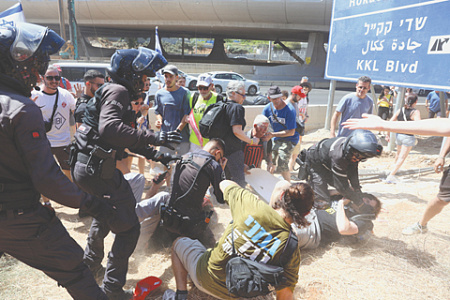
A nationwide strike has swept across Israel as protestors demand Prime Minister Benjamin Netanyahu’s government prioritize a deal with Hamas to free the remaining hostages and abandon plans for a significant military escalation in Gaza. The widespread civil disobedience, which began on August 17, saw demonstrators blocking major highways and city streets, reflecting a deepening societal rift over the direction of the war.
The protests erupted just days after Israel’s war cabinet approved plans on August 8 for an expanded military operation. Israeli police reported arresting 25 individuals for disturbances during the first morning of the demonstrations. The public pressure coincides with new diplomatic signals, as Hamas officials involved in negotiations have reportedly expressed a willingness to resume dialogue and accept a partial agreement, even softening their previous demand for a complete withdrawal of the Israel Defense Forces (IDF) from the Gaza Strip.
Voicing the opposition’s stance from Hostages Square in Tel Aviv, opposition leader Yair Lapid urged the ruling coalition to seize the opportunity for a deal. “Our hostages are not pawns that the government can sacrifice for military action,” Lapid stated in a video message. “They are citizens that the government must return to their families. We will continue to fight until the hostages come home, until a deal is reached, and the war ends.”
Adding a poignant dimension to the protests, the Hostages and Missing Families Forum, an organization representing relatives of the October 7 victims, announced the establishment of a protest camp near the Gaza border. Named “Point 50,” the camp symbolizes the 50 hostages believed to remain in Hamas’s captivity, of whom only 20 are thought to be alive. The families intend to remain at the site to amplify their call for the government to secure their loved ones’ release.
This public outcry stands in stark contrast to the military’s preparations. IDF Chief of Staff Lt. Gen. Eyal Zamir recently inspected troops on the front line, signaling an imminent new phase of the conflict. “We will soon move to the next stage of Operation Gideon’s Chariots, deepening the strikes against Hamas in Gaza City until its final defeat,” Zamir declared, while also affirming the IDF’s “moral duty to bring the hostages home—both the living and the dead.”
A recent poll conducted for the Maariv newspaper underscores the growing divide between the public and political leadership. Zamir enjoys high public approval at 50%, while Netanyahu’s satisfaction rating has plummeted to 36%, with 59% expressing dissatisfaction with his performance. This gap highlights the increasing tension between the military establishment and the Prime Minister’s office.
According to sources cited by the Saudi publication Asharq Al-Awsat, Hamas has significantly altered its negotiating position, signaling readiness to reconsider a U.S.-backed proposal. The plan reportedly includes a 60-day ceasefire in exchange for the release of half of the hostages. Crucially, the group appears to have dropped its insistence on a full IDF withdrawal from Gaza, a move that could unlock the stalled talks.
However, the Israeli government remains steadfast in its position. A statement from the Prime Minister’s Office on August 16 clarified that Israel would only consider a deal involving the simultaneous release of all hostages. The government reiterated its core principles for ending the war: the complete disarmament of Hamas, the demilitarization of the Gaza Strip, the establishment of Israeli security control, and the creation of an alternative civil administration that excludes both Hamas and the Palestinian Authority.
